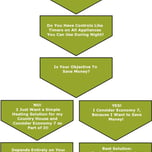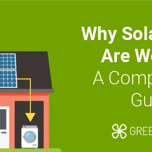Answer these simple questions and we will find you the BEST prices
Which type of solar quotes do you need?
It only takes 30 seconds
100% free with no obligation

Get up to 4 quotes by filling in only 1 quick form

Slash your energy bills by installing solar panels

For the average 2-3 bedroom house
- GreenMatch
- Blog
- DIY Solar Panels
Can You DIY Install Solar Panels in the UK? (April 2025)

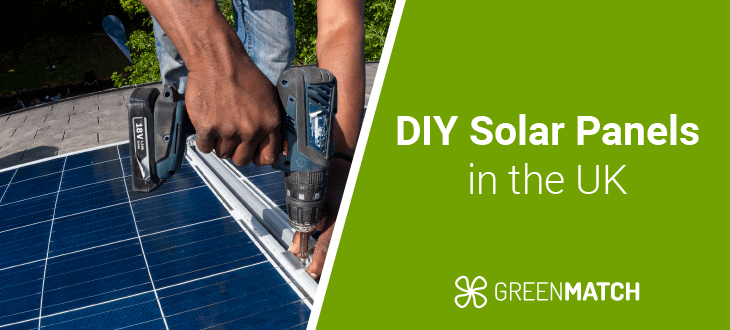
- While installing solar panels yourself is legal, self-installation has downsides like companies not providing excess energy exports to non-MCS accredited installers.
- DIY installation can be cheaper but may result in improper installation and may invalidate your manufacturer warranty.
- DIY kits are easier to install than DIY installing solar panels yourself but purchase costs can be higher.
- It is widely recommended to contact an installer rather than installing panels yourself.
When it comes to renewable technology installation, many often wonder “Can I install solar panels myself?” Although you can, there are many downsides to DIY or "Do It Yourself" solar panel installation. That’s also where DIY kits come in, allowing buyers to install their own solar panels easily.
Let’s go over the pros, cons, and prominent models for solar panel DIY and DIY solar installation in the UK.
However, if you’re unsure about installing solar panels yourself, you’ll need to find a reliable installer. Hiring an experienced professional is both safer and less stressful but it’s all about hiring the right one. Finding one can be a difficult task that takes days of research, calling up companies, and comparing their offers. Thankfully, it doesn’t have to be such a chore.
With our service, all you need to do is fill out a 30-second form and we’ll handle the rest. Click the button below and we’ll provide you with up to 4 free, non-binding solar panel quotes.
- Quotes from local engineers
- Payment by finance available
- Save up to £1,110 per year
It only takes 30 seconds



Can you install solar panels yourself?
Yes. It is possible to install solar panels yourself. It can be especially easy if you are installing ground-based mounts or if you buy a DIY kit. Installing on a roof can be more difficult, requiring lag bolts and decent drilling skills. Installing panels yourself can also come with potential downsides as many energy providers will not allow you to earn money for excess energy generation without an accredited installer and solar panel companies could cancel your warranty.
It is also best to attempt a DIY installation only if you are sure you know what you’re in for. Aside from the numerous technical issues that could arise, it can also be unsafe without the proper equipment, especially when installing solar panels on a roof.
On the other hand, it has also never been easier to install solar panels yourself. With the help of calculators and other online resources, you can easily determine how many solar panels you need. With a DIY kit, most of what you’ll need is measuring equipment, a good drill, and mostly the tools you’ll find in your toolbox.
That said, it can be a lot of work, especially if you’re looking to install off-grid solar panels, which can require precise placement and consistent power. Miscalculations could cause you to lose power or receive less than you need for your daily energy needs.
Long story short: While you can fit solar panels yourself, the affordability it provides also comes with the loss of warranties and DIY installations are not eligible for earnings from the Smart Export Guarantee (SEG), unless the panels you install are part of an MCS-registered DIY solar panel kit. A standard 3-bedroom house with a 4kW solar panel system could save between £485 to £730.
Is it legal to install your own solar panels in the UK?
Yes, it is fully legal to install DIY solar panels in the UK on your own. In some areas, planning permission may be required but, in most regions, there are no laws against it. The rules may differ if you live in a conservation area so it’s best to check with local authorities.
As always, if you are living in a rental property, it’s important to get clearance from your landlord before you try to fit your own solar panels. Additionally, there may be building regulations for solar panels for apartments.
Overall, it’s less of a question of “Can you install your own solar panels?” and more about what you could lose by doing it yourself. As mentioned earlier, certain benefits from manufacturers and installers can be a good incentive to hire a professional. You will not be allowed to make money from exporting solar energy, for example.
Pros and cons of DIY solar panel installations
There are a few points to consider before you go and self install solar panels.
| Pros | Cons |
|---|---|
| Potentially decreased costs | SEG earnings won’t apply |
| More control over the process | May void solar panel warranties |
| Better for vehicles | Potentially causes sub-par installation |
| No professional support |
Pros:
- Potentially decreased costs: You can save on labour costs and buy materials for cheaper rates than an installer will provide you with. There is a caveat, however: solar panel kits can often be more expensive when comparing the cost of solar panels and often come in lower outputs. Solar systems you make yourself can be far cheaper, avoiding £600 to £1,000 in labour costs on average, but will take a lot more effort and can be easy to mess up if you don’t know what you’re doing.
- More control over the process: With your own tailor-made solar panel installation, you can attach them as you want. If you have the design skills, you can tailor your solar panel arrays or roof mounts to your exact specifications and adjust them to your liking.
- Better for vehicles: DIY panel kits and solar panel setups can be cheaper and more appropriate for vehicles like RVs than they are for homes. They can easily be installed and uninstalled if necessary.
Cons:
- SEG earnings won’t apply: Many energy providers only allow SEG earnings for MCS-certified solar panel installations. You could potentially lose out on roughly 5p to 24p per kilowatt exported back to the grid.
- Potentially causes sub-par installation: An experienced professional brings a lot to the table you could miss out on. Improper installation can also mean that your panels or your solar kit will have a shorter lifespan and lose efficiency faster.
- May void solar panel warranties: Most solar panel manufacturers do not provide warranties for self-installed systems. If you’re looking to have some assurance in case of issues, it may not be the best idea to self-install solar panels in the UK.
- No professional support: Installers also provide extended coverage for installations, opting to fix any issues that may arise later as covered by their guarantees. While they cost more, they provide more than just a simple service. Aside from all the electrical work they also help you register your system and assess your home.
Best DIY solar panels kit in the UK

A DIY solar system kit can be a favourable alternative to standard panels due to the ease of installation but, to be honest, they may not be worth it compared to a proper installation. DIY panel kits are often best for mobile homes and outdoor applications. They have utility for homes but can be less powerful, less efficient, and only barely less expensive when taking into account savings versus purchase costs.
If you are looking for solar panels we recommend looking over our list of the best solar panels. If you want the ease of use of a DIY kit, continue reading but also be aware of their drawbacks.
- Sunstore 400W, 12V, 0.57kWh: This DIY home solar system is expensive but well-reviewed and Sunstore is a well-regarded company. They work both on-grid and off-grid, coming with a host of different cables, brackets, and connectors that make installation as easy as possible. Its main drawback is that the purchase costs are fairly high (£900 per 400W) compared to standard solar panels.
- Renogy 400 Watt 12 Volt: One of the best DIY solar panels in the UK. This is pretty easy to plug in and comes with solid brackets and most of the parts you’ll need. You may still have to buy a roof gland (if necessary), according to UK reviewers, but other than that the kit is quite comprehensive for the average home. Priced at almost £1,000 per 400W, we recommend it for energy generation on your RV or outdoor setup.
If you’re looking for the best deals on standard solar panels and their installation, we recommend checking out multiple installers before you make your decision. A good installer can provide A-grade service and swift installation at reasonable prices. Finding one can be tough (let alone finding multiple installers) which is why our service is a quicker alternative.
Avoid the hassle of researching and calling up companies. We can easily bring you up to 4 free, non-binding quotes from installers we’ve personally vetted. Click the button below to get started.
How to install solar panels yourself
There are 2 main ways to install solar panels yourself: either with a kit or buying and building a system piecemeal. Kits are easier to install but piecemeal systems can be cheaper. Below, we’ll cover the steps for the latter method.
If you want to install your own solar panels, here’s a basic rundown of how:
Preparation
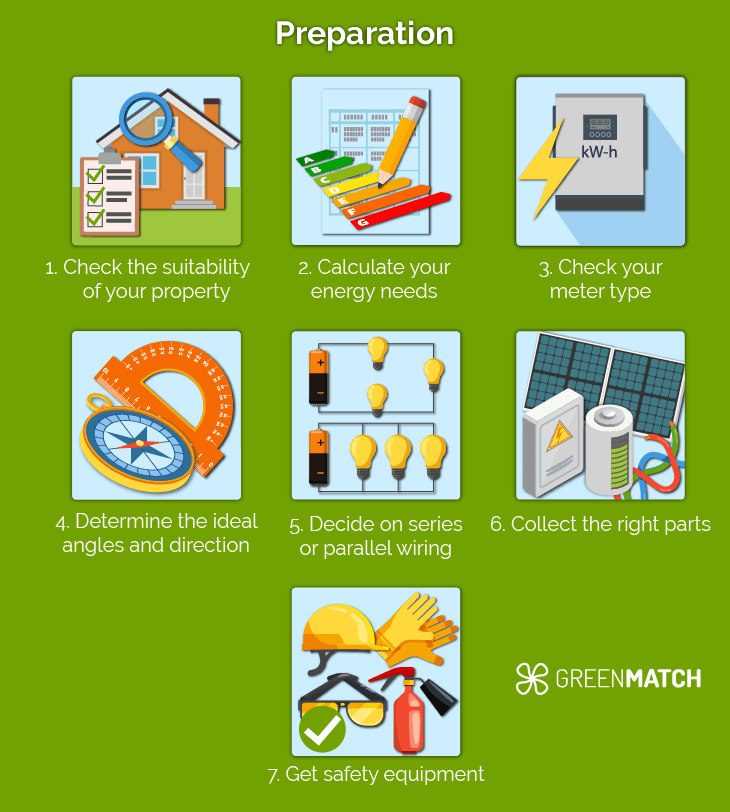
- Check the suitability of your property: Find out if your landlord or local authorities have rules against the changes you plan to make to the home. You also need to make sure your roof can handle 150kg per m2.
- Calculate your energy needs: Before you make your own solar system and install it, it’s best to have a good grasp of how powerful it needs to be. 3kW to 4kW systems work fine for the average 3-bedroom home in the UK but you may have different electricity needs.
- Check your meter type: It’s best to have an electricity meter that can turn back on energy calculations when the solar panels produce more energy than you consume. A digital smart meter can be most handy.
- Determine the ideal angles and direction: Check which direction your roof faces. Ideally, southward-facing panels perform the best. In terms of the best angle for solar panels, a roof pitch of 30° to 50° is great but if your roof can’t manage that, you could consider investing in adjustable mounts (for flat roofs).
- Decide on series or parallel wiring: Whether you decide to do series or parallel wiring can be important. Parallel wiring is better if you plan to hook your panels up to a lot of different electronics and don’t want to lose energy production if one of the panels is obstructed from light. Series wiring is generally better for connecting a large number of solar panels while maintaining voltage and efficiency.
We recommend parallel wiring but both have their benefits. Series wiring will allow for better voltage, less overheating, and additional cells to add to voltage. On the other hand, series wiring can lower your output since it defaults to the output of the weakest cell. Parallel wiring does not have this issue and is not hampered by shade and will continue to function despite inefficiencies in other panels. Although parallel can have lower efficiency, it will produce higher amperage.
- Collect the right parts: Aside from the solar panels, you will need an inverter, a support structure, cabling, and (potentially) your solar battery.
- Choose the right kit: When choosing DIY solar panels for home energy generation, it’s best to keep output, physical dimensions, and ease of installation in mind. Every kit should come with solar panels, wiring, inverters, and a racking system.
- Get safety equipment: Better safe than sorry, right? Before installing solar panels yourself, make sure you have some protective goggles, a hard hat, a sturdy ladder, a harness, a fire extinguisher, and appropriate gloves. You’ll also need a good drill and the appropriate measuring equipment.
Installation
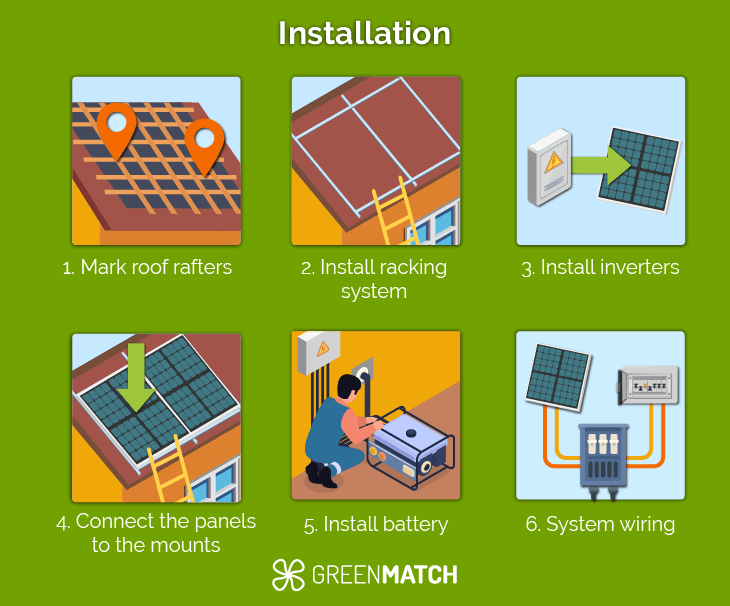
- Mark roof rafters: For roof-mounted kits, you will need to find and mark the rafters on your roof. These act as the foundation for your solar installation where you can put up the metal layer that will support the array. This installation means fitting a thin sheet of material to act as the attachment point and prevent leaks.
- Install racking system: The metal substructure should now be built, so the rest of the process is similar to the roof mounts. You’ll secure your racking rails to the support structure, which provides a foundation for your panels.
- Install inverters: The next step in the solar system DIY process is to get the inverters hooked up. Before you install the panels into their mounts, you will need to fasten small microinverters to the backs of each panel.
- Connect the panels and inverters to the mount: First, attach the end clamps to hook the first panel to the rails and use grounding mid-clamps to bind the solar panels and the rails together. Before bolting the panel onto the racking rail, install the connecting wires (they won’t be accessible after). Add another set of end clamps to fasten the panels.
- Install battery: Once the panels have been secured to the mount, the final installation step is to wire the system components together according to your “planset”. The wires from your inverter(s) will be routed through a junction box and a PV disconnect switch, before finally terminating at your home’s circuit breaker box that connects your system to the grid.
- System wiring: Almost at the finish line. The wires from your inverters need to pass through a junction box and a solar panel disconnect switch. It should terminate at your home’s circuit breaker box which connects you to the grid.
Post-installation
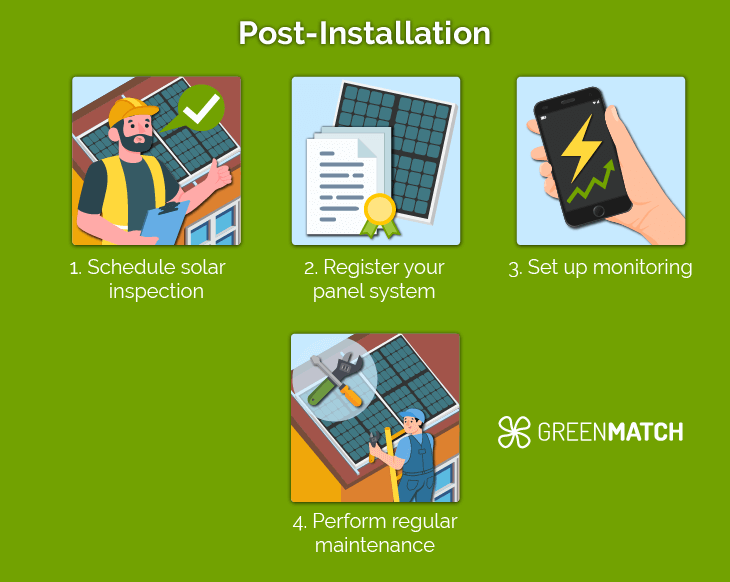
- Schedule solar inspection: You may want to contact local companies to check your solar panels to see if they are properly installed.
- Register your panel system: Self-installed solar panels need to be registered with your Distribution Network Operator (DNO) i.e., the company responsible for bringing electricity to your home.
- Set up monitoring: Once you’re done fitting your own solar panels, you need to make sure they are running optimally. You can connect your panels to the Internet so you can keep track of your system’s performance.
- Perform regular maintenance: Solar panel maintenance is easy and practically free. Get a light brush and clean the panels lightly every once in a while (roughly after every month or two).
Is it a good idea to install a DIY solar system on your UK home
While it’s completely legal and possible to install your own solar panels, it is best to have a professional installer do the job. You can lose out on a lot of benefits that only come with MCS or other accredited installers such as warranties and SEG earnings. This is especially crucial if you’re looking to make some extra money off of your solar installation.
Before installing your own solar panels, you should definitely check whether your roof and electric system are suitable for them. DIY solar power systems often have a high number of processes involved, so you will have to check which ones may be hazardous to your roof.
There are actually a lot of points we didn’t cover as they may relate to your specific home and energy situation. If all of this information seems overwhelming, you may want to consider hiring a professional installer.
The problem with installers is that you need to be sure you’re hiring a trustworthy one who provides great service and can help you navigate things like solar panel grants. While this can ordinarily take days of time-consuming research and contacting companies, we can streamline your search and provide you with multiple prices.
All you have to do is fill out a 30-second form and we’ll provide you with up to 4 free, non-binding quotes from reputable installers in your area. We’ve thoroughly vetted them ourselves so you can be sure they’re up to the task. Click the button below to get started.
- Quotes from local engineers
- Payment by finance available
- Save up to £1,110 per year
It only takes 30 seconds



FAQ
Yes, it is fully legal and possible to self-install solar panels in the UK. While this can be cheaper in labour costs, it comes with quite a few drawbacks.
You do not necessarily need an electrician but there are many things you should know before you make your own solar system and attempt to install it.
DIY kits can be worth it for RVs and Motor homes but can be expensive for full homes. Aside from DIY kits, you can build your own solar own solar system from various panels which can be more effect.

Rawal Ahmed is a writer at GreenMatch with an interest in sustainability and a background in tech journalism and digital marketing.
We strive to connect our customers with the right product and supplier. Would you like to be part of GreenMatch?



